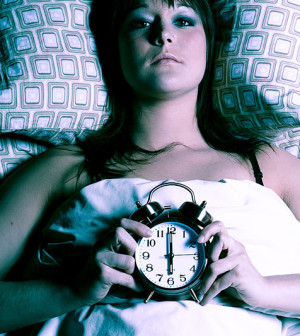- Double Mastectomy May Offer No Survival Benefit to Women With Breast Cancer
- Toxic Lead Found in Cinnamon Product, FDA Says
- Certain Abbott Blood Sugar Monitors May Give Incorrect Readings
- Athletes Can Expect High Ozone, Pollen Counts for Paris Olympics
- Fake Oxycontin Pills Widespread and Potentially Deadly: Report
- Shingles Vaccine Could Lower Dementia Risk
- Your Odds for Accidental Gun Death Rise Greatly in Certain States
- Kids From Poorer Families Less Likely to Survive Cancer
- Tough Workouts Won’t Trigger Cardiac Arrest in Folks With Long QT Syndrome
- At-Home Colon Cancer Test Can Save Lives
Black Americans at Raised Risk of Insufficient Sleep, Study Finds


MONDAY, Sept. 9Black Americans are more likely than whites to get too little sleep and this disparity is greatest among people in professional occupations, a new study shows.
Lack of sleep has been linked with increased risk of health problems, such as obesity, high blood pressure, diabetes, heart disease and even death.
For the study, researchers analyzed data collected from nearly 137,000 American adults between 2004 and 2011, and found that 30 percent of them were short sleepers (getting less than seven hours of sleep a night), 31 percent were optimal sleepers (getting about seven hours of sleep a night), and 39 percent were long sleepers (getting more than seven hours of sleep a night).
Further analysis revealed that 37 percent of black participants were short sleepers, compared with 28 percent of white participants. Among people in professional or management positions, blacks were much more likely than whites to be short sleepers (42 percent versus 26 percent), according to the Harvard School of Public Health researchers.
Blacks working in support services or as laborers were also more likely than whites to be short sleepers, 37 percent versus 26 percent and 35 percent versus 32 percent, respectively. The only job sectors in which blacks and whites had similar rates of short sleep were the retail and food industries.
The findings were published online Sept. 9 in the American Journal of Epidemiology.
“With increasing numbers of blacks entering professional and management roles in numerous industries, it is important to investigate and address the social factors contributing to the short sleep disparities in blacks compared with whites in general, and particularly in professional settings,” study author Chandra Jackson, a postdoctoral research fellow in the department of nutrition, said in a Harvard news release.
Possible sleep-disrupting factors that affect blacks more than whites include: job stress; workplace discrimination or harassment that can increase job stress; limited control over job demands or prestige; long work hours; stress at home; and limited access to professional and social networks that provide emotional or financial support.
In addition, blacks are more likely than whites to do shift work and are also more likely to live in city neighborhoods with high noise levels at night, the researchers noted.
And, the study authors pointed out, it’s also possible that a high work ethic among blacks — a strong desire to succeed against all odds — could lead to stress, disrupted sleep and harmful health effects.
More information
The U.S. National Institute of Neurological Disorders and Stroke has more about sleep.
Source: HealthDay
Copyright © 2024 HealthDay. All rights reserved.










